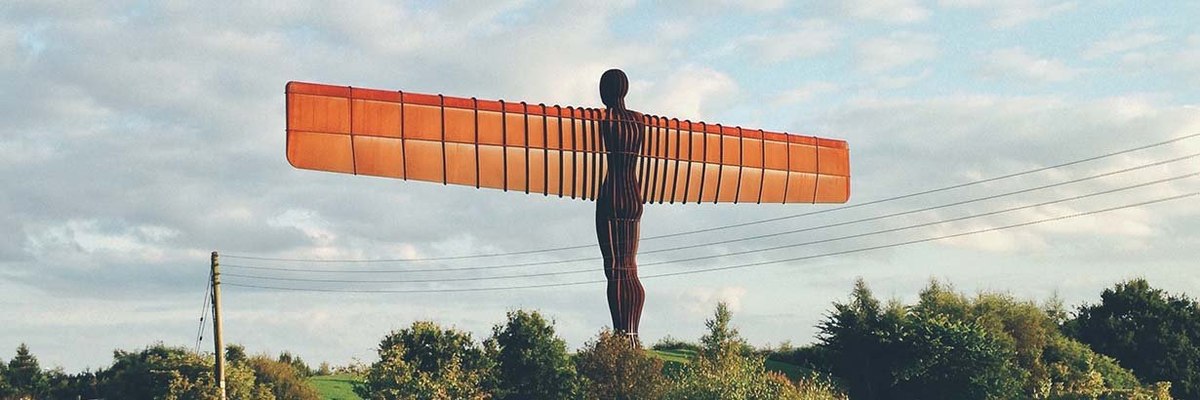Nearly half of North Easterners have a very strong attachment to their region, though this is true of just 11% of East Midlanders
Like all large countries, Britain is divided into regions. However, a key difference with countries like Germany or Canada is that these regions aren’t at all uniform, don’t hold the same history or even serve the same purpose. Scotland and Wales are long-established countries with powerful devolved institutions, while some may feel the East Midlands is little more than a collection of counties for statistical purposes. So do Britons actually feel attached to these regions?
Perhaps unsurprisingly, the answer depends on where you are.
Nearly half of those who live in the North East (48%) say they have a “very strong” attachment to the region, a strength of identity similar to that found in Wales, where 49% have a very strong attachment to their country. This is, though, less than the 61% of Scots who have such an attachment to their country.
Roughly four in ten Londoners (38%) feel a very strong attachment to the capital, while around a third of those who live in the North West (35%), Yorkshire and the Humber (34%) and the South West (32%) describe their bond with their region in the same terms.
Just one in five people in the South East (22%) feel a very strong attachment to the region, alongside one in six of those in the East of England (16%). Midlanders show the least feeling for their official regions, with just 13% of West Midlanders and 11% of East Midlanders holding a very strong attachment to their respective region.
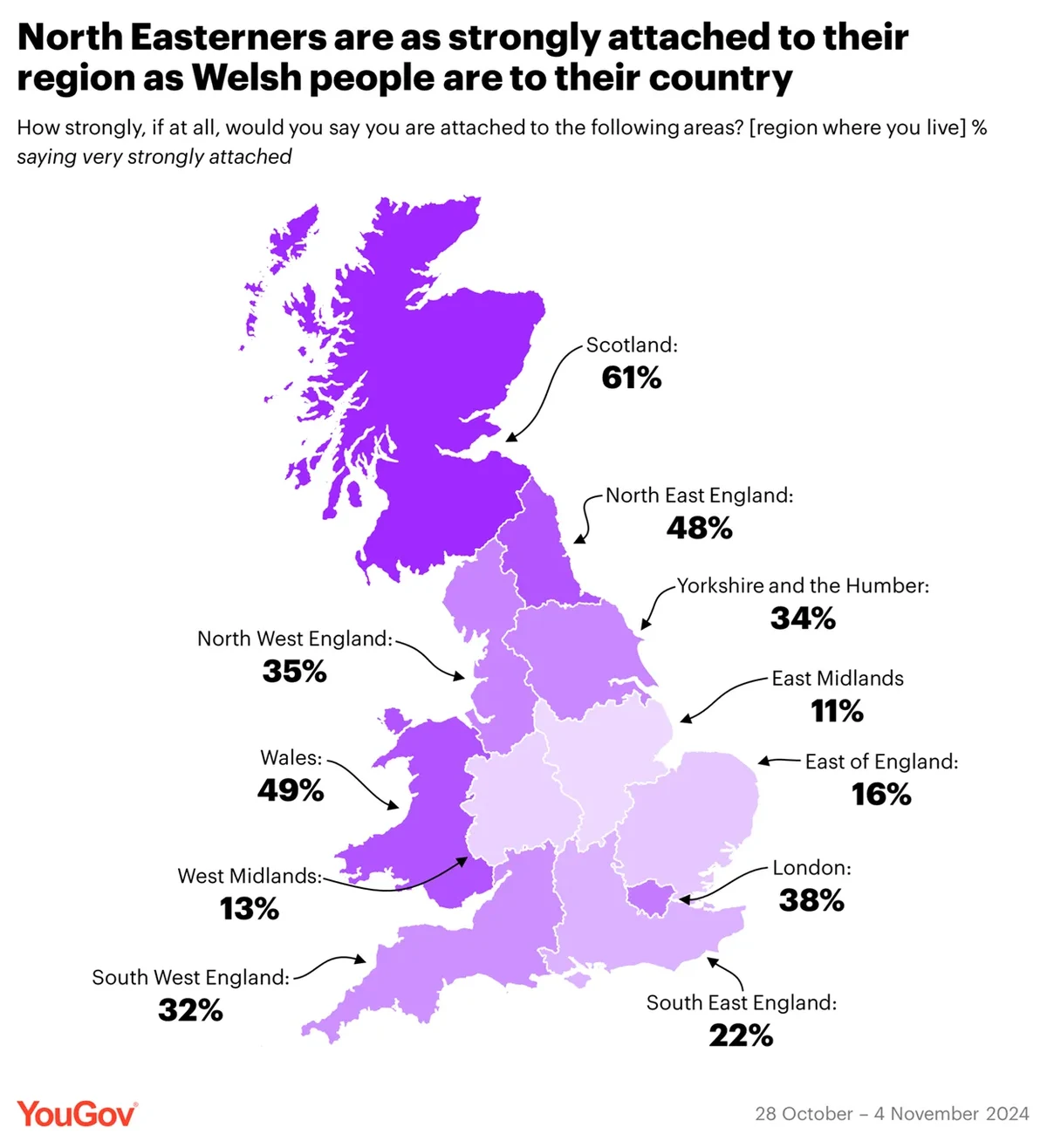
How does regional identity compare to other place-based identities?
Some have suggested that the limited levels of regional identity in England are down to the regions being artificial constructs that people aren’t really attached to, with them instead having a stronger connection to counties or England as a whole. But how true this is differs from region to region.
Attachment to England is reasonably consistent across regions, with 29-35% in all nine English regions expressing a very strong attachment to their country, compared to a more varied 11-48% holding such a connection to their region.
People are more likely to express a very strong attachment to England than their region in the East Midlands (by 24pts), West Midlands (18pts), East of England (16pts) and South East England (13pts). However, in the North East and London, people are more likely to express an attachment to their region than to England, by 16pts and 9pts respectively.
In the North West, the South West and Yorkshire and the Humber, attachments to the region and nation are roughly equally strong.
A similar picture can be seen with attachments to counties. In the North East, the stronger affinity is with the region than to counties (regional attachment is 18pts higher), while the opposite is true in the East Midlands (county attachment is 13pts higher), West Midlands (9pts) and East of England (9pts).
What do people think about their region?
A regional identity is dependent on some ability to distinguish your region from another, so what do Britons see as the most unique aspects of their region? We asked them to tell us in their own words and then categorised the answers.
For many, natural features are what sets their region apart. The countryside or scenery are the most distinctive thing about Yorkshire and the Humber for 36% of the people who live there, about Scotland for 34% of Scots, and about Wales for 30% of Welsh people. It was also the top category in the South West (26%), South East (16%) and East Midlands (12%).
Southerners are particularly enamoured by their marine features, with 24% of those in the South West, as well as 13-15% of those in the South East and East of England, highlighting their beaches, coast or sea as the most distinctive thing about their region.
Others see human traits as worth highlighting. One in five in the North East (20%) and North West (19%) see friendliness or sense of humour as the most distinctive things about their region, with a further 18% of North Easterners more broadly saying ‘the people’ were key to the area’s uniqueness.
Diversity and multiculturalism are the most distinctive characteristic about London for 27% of Londoners. One in nine (11%) see the capital’s attractions (such as the London Eye or Big Ben) as the thing that sets it apart from elsewhere, a title that goes to its public transport for 8% of Londoners.
Language is another dividing line, with 13% of Welsh people identifying the Welsh language as the country’s most distinctive feature and 12% of West Midlanders saying their accent was what makes their region unique.
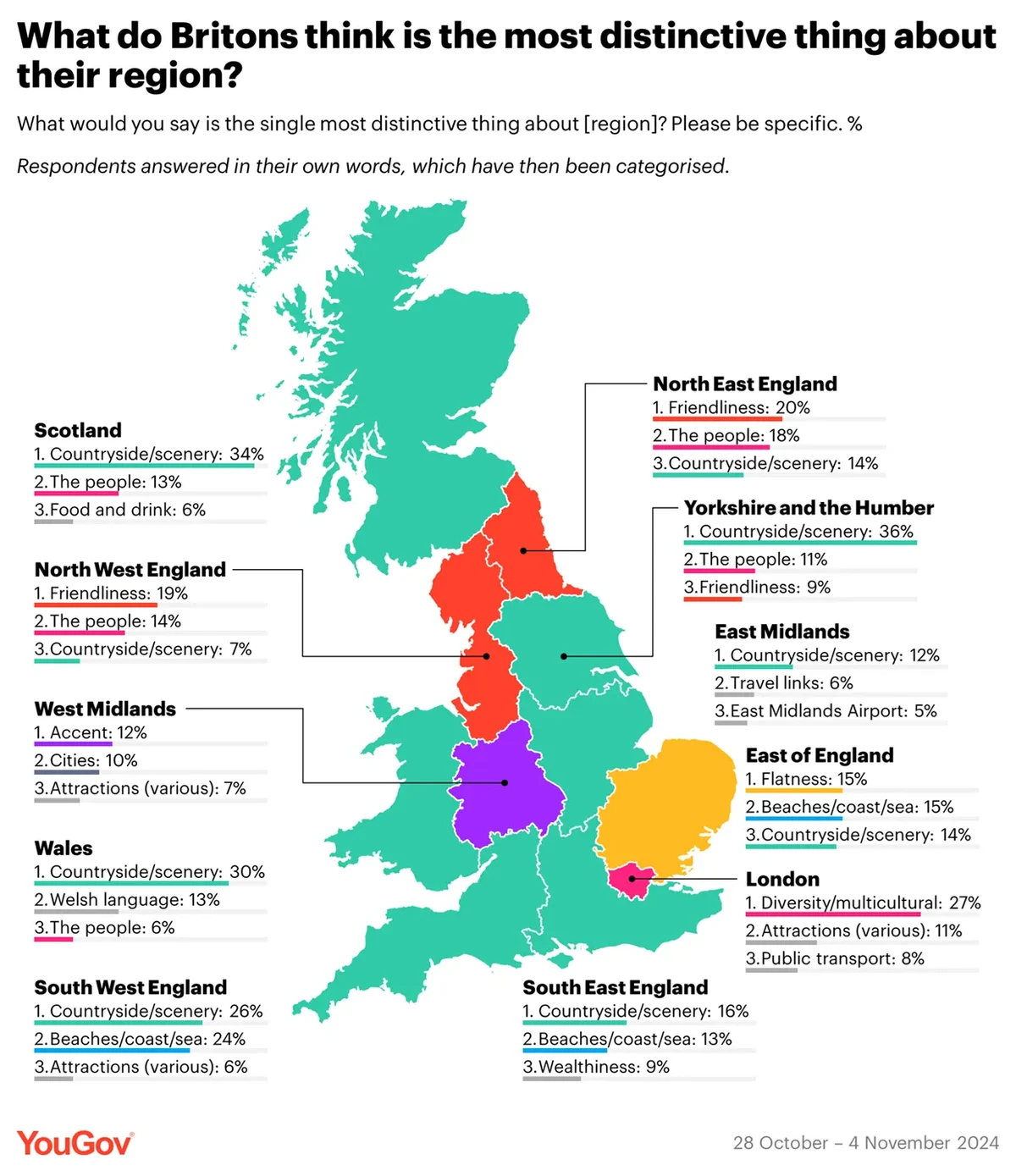
Money is a particular obsession for some in the South East, with 9% saying the region’s relative wealth is its distinctive feature, while another 9% say the high cost of living was what sets it apart.
Some 7% of North Easterners say the Angel of the North is the most distinctive feature of their region, with the same proportion of people in Yorkshire and the Humber saying so of the Humber Bridge. The East Midlands Airport is the distinguishing feature of the region for 5% of East Midlanders, while 5% of South Easterners believe it is chalk cliffs that make them unique.
Nonetheless, one in ten Britons (10%) either felt there was nothing distinctive about their region or couldn’t come up with anything, with this feeling noticeably highest in the East Midlands (23%) and East of England (18%), likely partially explaining why attachment to these regions is comparatively low.
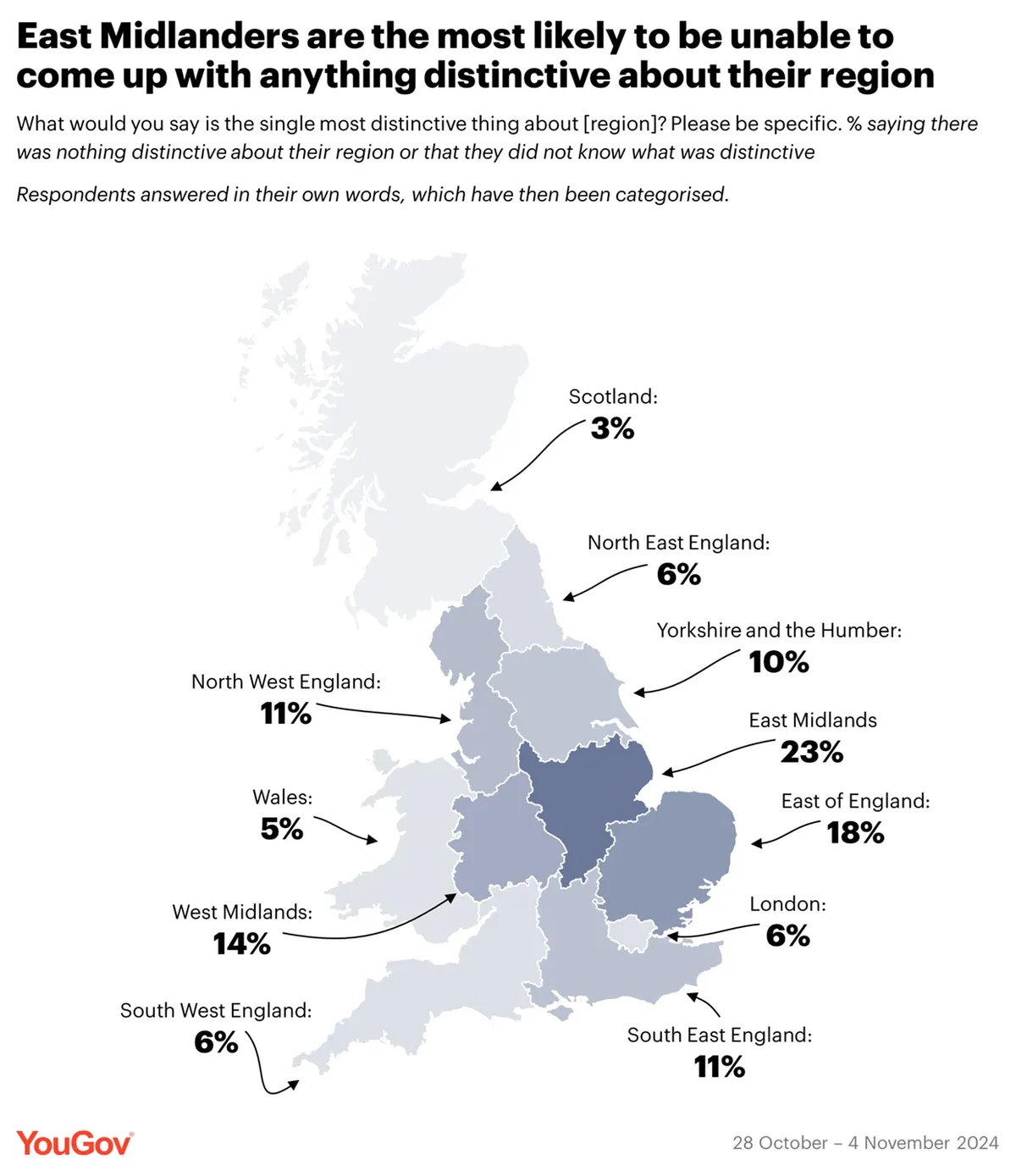
Do Britons believe their region is better than others?
Most Britons feel their region is a better place to live than other parts of the UK, with this feeling highest in the South West (83%) and Scotland (76%).
Again, a lack of confidence in their region is highest among Midlanders, with just 44-46% believing the East or West Midlands are better places to live than other regions, while 37% of West Midlanders say their region is a worse place to live than other parts of the country.
What do people think of alternative regional identities?
It’s not the case that people have weak attachment to the standard English regions because they have a greater one to alternative or historical regions.
Just 4% of people in the South West have a very strong attachment to Wessex, while only 1-2% of those in the two Midlands regions hold such a connection with Mercia. One in seven North Easterners (15%) do say they are very strongly attached to Northumbria, a historic kingdom that once covered the region, but this is less than a third of the number who say they are similarly attached to the North East.
It appears that those who live in the East of England don’t draw a particular distinction between the region’s official name and the idea of East Anglia, with the 14% of Easterners having an Anglian attachment, roughly the same as have a very strong connection to the East of England.
The inclusion of part of Lincolnshire in the Yorkshire and the Humber region has sometimes been a bugbear for people from Yorkshire, but residents of the region are only a little more likely to profess a very strong attachment to Yorkshire itself (40%) than to Yorkshire and the Humber (34%).
While not quite as weak, English people also tend to feel less attached to ‘super-regions’, i.e. the North, Midlands and South, than they do to their more specific region. In South West England, for instance, just one in seven (14%) hold a very strong attachment to the South of England, compared to a third who are likewise attached to the South West.
Northern identity is, however, stronger than the rest, with 31% of those living in the three northern regions holding a very strong attachment to the North, compared to 14% of Southerners being similarly close to the South and 8% of Midlanders to the Midlands.
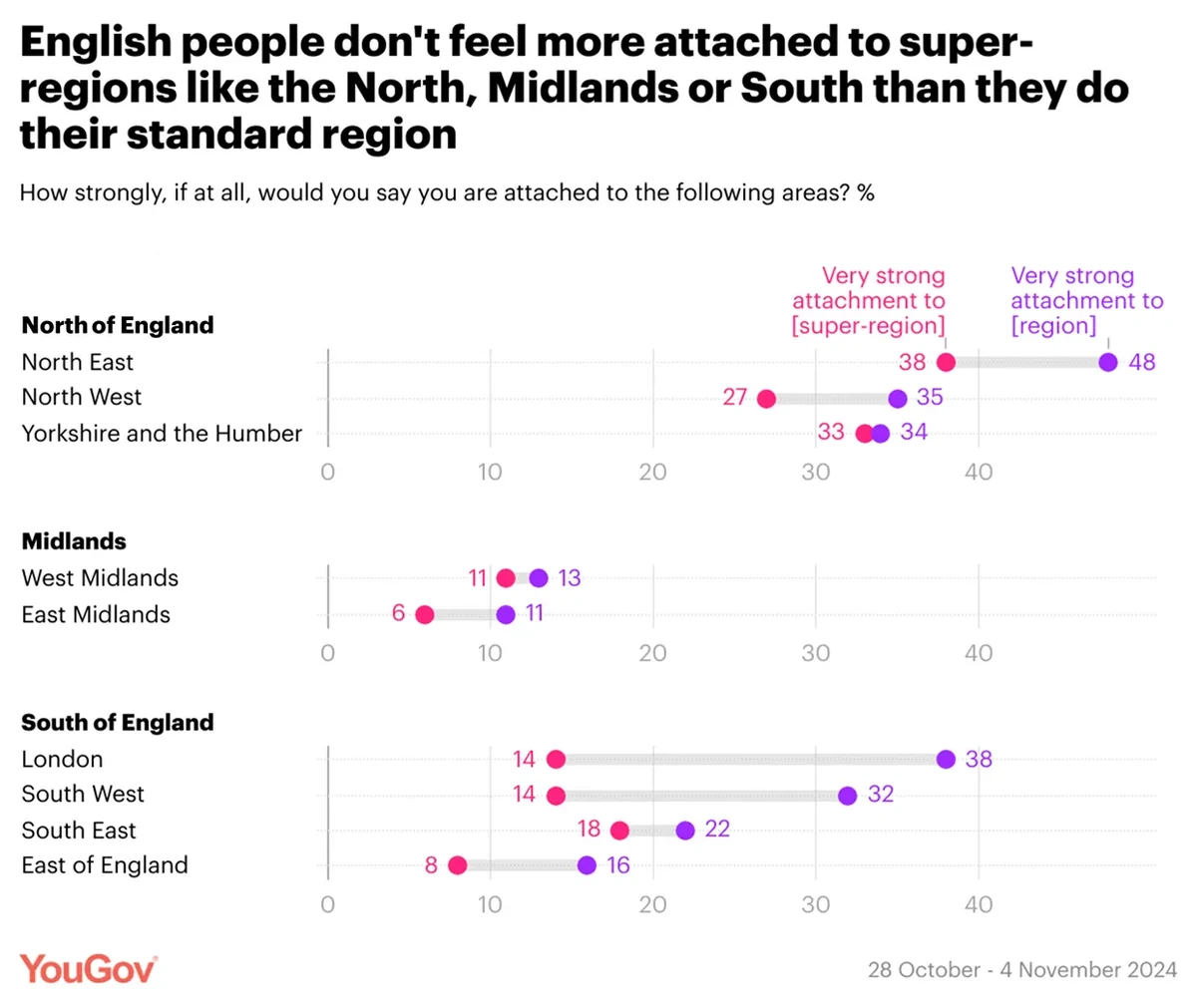
How strongly are you attached to the region where you live? What do you think about identity in general, and everything else? Have your say, join the YouGov panel, and get paid to share your thoughts. Sign up here.
Photo: Getty
